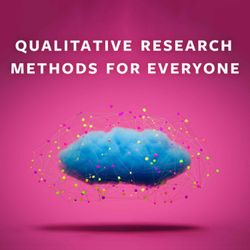Latest episode
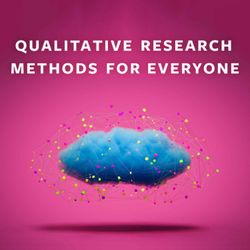
Qualitative Research Methods for Everyone: An Essential Toolkit
01:05||Ep. 0The Qualitative Research Methods for Everyone podcast brings author and professor Karen O’Reilly into challenging conversations with students, academics and practitioners around the world. Together, they explore how the toolkit approach - a curated collection of expert skills, knowledge, procedures, tools and information - can help navigate the complex terrain of contemporary qualitative research methods. Special thanks to Bahar Celik Muller, Senior Marketing Executive and Martha Gleeson, Digital Marketing Executive, for their support, advice and expertise. Find out more about the book: https://policy.bristoluniversitypress.co.uk/qualitative-research-methods-for-everyoneIntro music: Good Times Are Coming by Bohdan Kuzmin from Pixabay.
More episodes
View all episodes
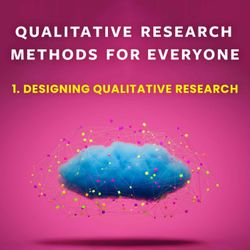
1. Designing Qualitative Research
28:50||Ep. 1The Qualitative Research Methods for Everyone podcast brings author and professor Karen O’Reilly into challenging conversations with students, academics and practitioners around the world. Together, they explore how the toolkit approach - a curated collection of expert skills, knowledge, procedures, tools and information - can help navigate the complex terrain of contemporary qualitative research methods. Today we are joined by Paul Stevens, Senior Commissioning Editor at Bristol University Press, who has been my strength and guide throughout the commissioning and writing process. Paul is also a PhD student in sociology at University of Bristol, exploring how the academic book is constructed by different actors including researchers, policymakers, publishers and other market intermediaries. In this episode, we focus on the first chapter of the book, Designing Qualitative Research. Paul asked me what motivated me to write the book in the first place and my answer was simple: students. We discuss the value of qualitative research for those working in non-academic settings. We then move on to explore the meanings of the term reflexivity, the difference between deductive and inductive and what I mean by iterative induction (which is easier to understand than iterative-inductive, which is the phrase I use more). We then move on to epistemology and ontology, tackling some more of the big words. The book has toolkit boxes that outline a definition for all of these and for everything we cover in future podcasts too. We even end by talking briefly about generative AI and qualitative research (thanks, Paul, for stepping into that minefield). Special thanks to Bahar Celik Muller, Senior Marketing Executive and Martha Gleeson, Digital Marketing Executive, for their support, advice and expertise. Find out more about the book: https://policy.bristoluniversitypress.co.uk/qualitative-research-methods-for-everyoneIntro music: Good Times Are Coming by Bohdan Kuzmin from Pixabay.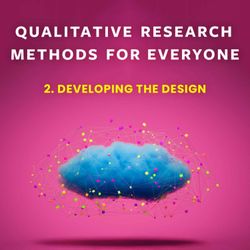
2. Developing the Design
24:18||Ep. 2The Qualitative Research Methods for Everyone podcast brings author and professor Karen O’Reilly into challenging conversations with students, academics and practitioners around the world. Together, they explore how the toolkit approach - a curated collection of expert skills, knowledge, procedures, tools and information - can help navigate the complex terrain of contemporary qualitative research methods. My guest this week is Dr Jakub Stachowski. Jakub is Associate Professor of Sociology at the Norwegian University of Science and Technology. We’ve known each other for a few years having worked together on the amazing Glarus project (Global Labour in Rural Societies). His PhD used ethnographic methods to understand the processes of integration among Polish migrants in rural areas in Norway and his research interests are in migration and mobility, urban and rural areas, prison sociology, social theory and qualitative research methods. While chatting about Chapter 2, Developing the Design, we hear more about Jakub’s current work in war-affected border zones, in northern Norway and in Poland. We talk about how we both understand an interpretivist approach to sampling and explore the new concepts in Qualitative Research Methods for Everyone: initial, ongoing and final samples, as well as sample fitness. Jakub explains how he selected people and places for his research in an ongoing way, starting with communities, ethnicity and nationality as key ‘variables’, but adapting these choices as he learned more about the communities. He describes locating people through key informants as well as simply being there and finding different people. We hear about how ethnography can proceed through ongoing return visits to places, as well as through analysis of online forums. Jakub emphasises how sampling and other decisions must be reflexive but also rigorous and trustworthy. Special thanks to Bahar Celik Muller, Senior Marketing Executive and Martha Gleeson, Digital Marketing Executive, for their support, advice and expertise. Find out more about the book: https://policy.bristoluniversitypress.co.uk/qualitative-research-methods-for-everyoneIntro music: Good Times Are Coming by Bohdan Kuzmin from Pixabay.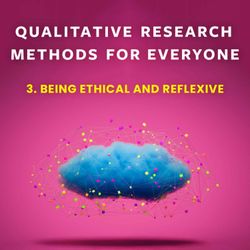
3. Being Ethical and Reflexive
30:10||Ep. 3The Qualitative Research Methods for Everyone podcast brings author and professor Karen O’Reilly into challenging conversations with students, academics and practitioners around the world. Together, they explore how the toolkit approach - a curated collection of expert skills, knowledge, procedures, tools and information - can help navigate the complex terrain of contemporary qualitative research methods. I’m delighted to be joined this week by Professor Line Nyhagen. Line is Professor of Sociology and Head of Department at Loughborough University, working in the areas of religion, gender, feminism and citizenship. She has authored several books and peer-reviewed articles and I especially want to draw attention to her recent book Intersectional Feminist Research Methodologies: Applications in the Social Sciences and Humanities (co-edited with Jennifer Cooke) , which sadly I heard about too late to mention in Qualitative Research Methods for Everyone.In this podcast, focusing on Chapter 3, Being Ethical and Reflexive, we talk about how we both understand reflexive practice as an ongoing approach to reflexivity that takes place throughout a research project. Drawing on examples of reflexive practice in our own research engagements, we explore the notions of positionality and positioning, considering the extent to which our research might be limited or enhanced by who we are.Both of us are driven by the desire to engage in ethical practice and to learn from our research participants with humility, so we also touched on issues of trust, rapport, risk and harm. Line shares a great example from her new book of what she terms a positionality statement—you will need to listen to the podcast to hear more about that.Special thanks to Bahar Celik Muller, Senior Marketing Executive and Martha Gleeson, Digital Marketing Executive, for their support, advice and expertise. Find out more about the book: https://policy.bristoluniversitypress.co.uk/qualitative-research-methods-for-everyoneIntro music: Good Times Are Coming by Bohdan Kuzmin from Pixabay.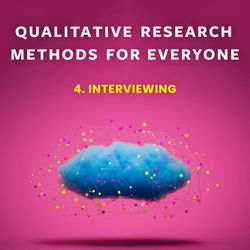
4. Interviewing
32:59||Ep. 4The Qualitative Research Methods for Everyone podcast brings author and professor Karen O’Reilly into challenging conversations with students, academics and practitioners around the world. Together, they explore how the toolkit approach - a curated collection of expert skills, knowledge, procedures, tools and information - can help navigate the complex terrain of contemporary qualitative research methods. This week’s guest is the wonderful and tireless Dr Zsuzsanna Iyizoba-Ebozue. Zsuzsanna is Clinical Oncologist at the Leeds Cancer Centre with research interests in radiotherapy trials, survivorship and quality of life in head and neck cancers. She also works with the Royal College of Radiologist to promote diversity, equality and inclusion in clinical oncology education and research. I have been working with her recently on qualitative research about differential attainment and a reverse mentoring scheme she has been piloting.Our discussion centers on Chapter 4, Interviewing. Zsuzsanna talks about her research with oncology patients and professionals and how adapted her original approach to interviewing to be more open and flexible. We discuss what objectivity and interpretivism mean in practice and conclude that an interview that proceeds as a conversation involves learning on both sides.Zsuzsanna reflects on how her interview participants must have seen her—as either a fellow professional or as a clinician—and how this may have shaped their responses. We agree this is something to think about before, during and after an interview. We share a great discussion about creative and alternative approaches to interviewing and I give a few examples from my own work, including photo elicitation and online interviews. Special thanks to Bahar Celik Muller, Senior Marketing Executive and Martha Gleeson, Digital Marketing Executive, for their support, advice and expertise. Find out more about the book: https://policy.bristoluniversitypress.co.uk/qualitative-research-methods-for-everyoneIntro music: Good Times Are Coming by Bohdan Kuzmin from Pixabay.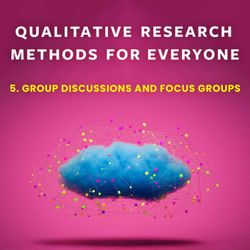
5. Group Discussions and Focus Groups
27:21||Ep. 5The Qualitative Research Methods for Everyone podcast brings author and professor Karen O’Reilly into challenging conversations with students, academics and practitioners around the world. Together, they explore how the toolkit approach - a curated collection of expert skills, knowledge, procedures, tools and information - can help navigate the complex terrain of contemporary qualitative research methods. Today I am fortunate to have Dr Nick Osbaldiston joining me from Australia. Nick is Associate Professor at James Cook University and a research fellow at the Cairns Institute. His research work focuses on lifestyle migration, internal migration, social theory, Australia's coasts, higher education labour and climate change adaptation.Our chat centred around Chapter 5, Group Discussions. Nick teaches focus group methods to social work students, who enjoy using the approach to investigate policy. Nick also has unique insights because he uses diverse quantitative and diverse qualitative methods in his own research.He raises the issue of power in group interviews and surprisingly tells us he sometimes finds it more valuable to observe power dynamics in a group rather than trying to manage them. For example, he has brought government officials, NGOs and community members together to see how they interact and to note the nature of dominant voices.We also touch on body language and emotional reflexivity, highlighting how emotions—not necessarily negative ones—can inspire fantastic group discussions. It is great to hear some of Nick’s anecdotes from his applied and coastal research. A fantastic insight insight he offers: you can teach methods for decades, but you only really learn them with experience. Special thanks to Bahar Celik Muller, Senior Marketing Executive and Martha Gleeson, Digital Marketing Executive, for their support, advice and expertise. Find out more about the book: https://policy.bristoluniversitypress.co.uk/qualitative-research-methods-for-everyoneIntro music: Good Times Are Coming by Bohdan Kuzmin from Pixabay.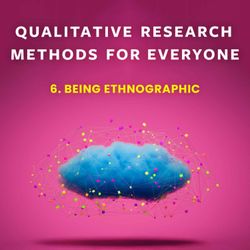
6. Being Ethnographic
30:28||Ep. 6The Qualitative Research Methods for Everyone podcast brings author and professor Karen O’Reilly into challenging conversations with students, academics and practitioners around the world. Together, they explore how the toolkit approach - a curated collection of expert skills, knowledge, procedures, tools and information - can help navigate the complex terrain of contemporary qualitative research methods. My long-time friend and colleague, Dr Karen Lumsden, joins me today. Karen is a sociologist, criminologist and qualitative research trainer and consultant. Her research expertise includes the sociology of policing, emotional labour, death work and bereavement, victims' experiences, cybercrime and qualitative methods including narratives, autoethnography, ethnography and reflexivity.Karen is the perfect guest to discuss Chapter 6, Being Ethnographic. We begin with a self-indulgent chat about how we both started out on our own ethnographic research journeys—me in the Costa del Sol, Karen in Aberdeen with boy racers and local communities. Karen’s research was flexible and responsive, using multi-modal and online approaches long before they were widely recognized as distinctive methodologies. We cover rapport and trust, emphasizing how ethnographers often assist our participants in ways that might not be directly related to our research. We also touch on AI and discuss the various emerging approaches to ethnography, sharing concerns that the core quality of ethnography might be at risk. Finally, we start to think about how decolonizing ethnography might make us rethink its principles, revisit its flexibility and reaffirm its commitments. Listen if you want to hear what we think remains central to ethnography despite its evolving methods and creative expansions.Special thanks to Bahar Celik Muller, Senior Marketing Executive and Martha Gleeson, Digital Marketing Executive, for their support, advice and expertise. Find out more about the book: https://policy.bristoluniversitypress.co.uk/qualitative-research-methods-for-everyoneIntro music: Good Times Are Coming by Bohdan Kuzmin from Pixabay.
